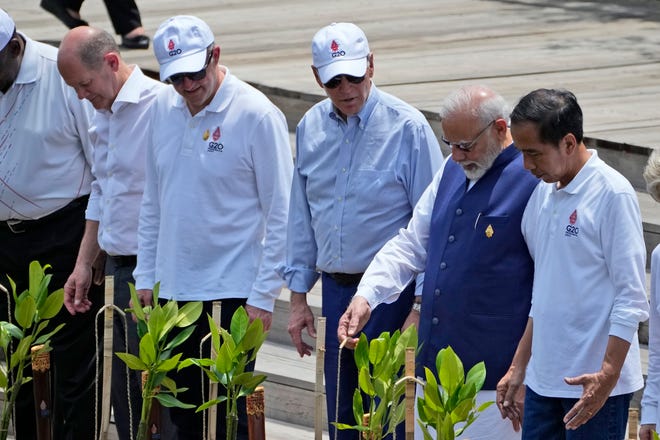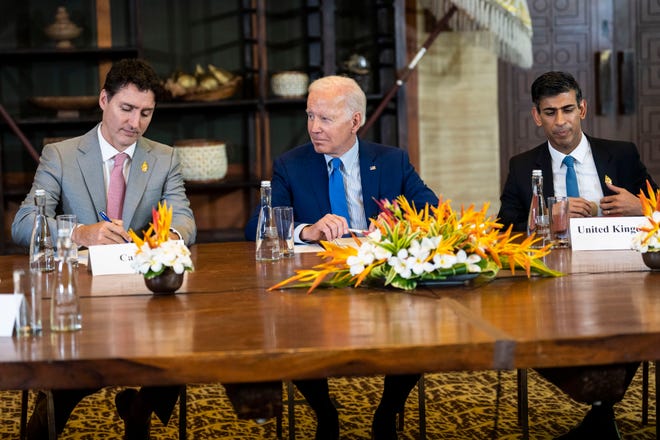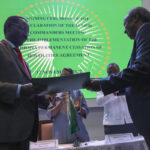BALI, Indonesia — President Joe Biden was supposed to have a relatively stress-free Wednesday as he wrapped up his time on the resort island of Bali at the Group of 20 Summit.
It had been an atypical conference, with Russia’s war on Ukraine dominating much of the agenda. The group traditionally meets around economic issues, which this year were directly linked to sanctions on Russia and rising global energy costs.
To finish up his time in Asia, the U.S. president had planned to plant a mangrove tree with G-20 leaders and meet with the U.K. prime minister before an afternoon return to Washington for his granddaughter’s weekend wedding celebration.
But overnight, reports began circulating that two civilians in a rural Polish town near the Ukrainian border had been killed by a missile.
U.S. officials scrambled to determine whether the strike was an intentional attack on a NATO ally, which would warrant a military response, or the result of an errant Russian missile that had veered off target, possibly because of Ukrainian air defense systems.
The scenario that played out in the early hours of Wednesday morning local time was one of chaos and confusion as Biden and the leaders of the world’s most powerful economies would have been fast asleep.
US, NATO INVESTIGATE BLAST IN POLAND:Biden says missile unlikely to have been fired from Russia

Nations including Italy, Germany, France, the U.K., Japan and Canada, which collectively make up the G-7 alongside the U.S., had been meeting formally and informally for two days in Indonesia. They had concluded their evening with a gala.
Biden did not attend the dinner. Russian President Vladimir Putin was not at the summit.
Russia’s foreign minister was captured leaving Bali on Tuesday evening in video taken by AFP as Moscow launched its attack on Kyiv and other parts of Ukraine.
Instead, the president was up before dawn, and fielding phone calls from his Bali hotel.
Biden spoke to his Polish counterpart Andrzej Duda, followed by NATO Secretary General Jens Stoltenberg.
He hustled shortly thereafter to an emergency roundtable with G-7 countries attending the summit, plus the heads of the European Commission, the European Council, the Netherlands and Spain.
The press was ushered into the ballroom decorated with Balinese umbrellas where Biden and other leaders posed for a solemn photo – a departure from the customary “family photo” of heads of government that is a standard in these global summits.

After their discussion, Biden said in remarks: “We agreed to support Poland’s investigation into the explosion in rural Poland, near the Ukrainian border. And I’m going to make sure we figure out exactly what happened.”
Biden has long promised that America would fight alongside its allies to defend every inch of NATO territory if Russia takes its war beyond Ukraine’s borders.
Ukraine is not a NATO member nation. Poland is. And an attack on one NATO nation, according to the security organization’s charter, is considered to be an attack on all.
The United States has provided roughly $20 billion to Ukraine for its defense since Russia launched its February invasion to keep the fight from moving into other parts of Europe.
Yet, in addressing reporters just after G-7 leaders met for crisis talks, Biden offered an ominous warning that preliminary information indicated that missile responsible for the strike was not fired from Russia.
“We’re going to collectively determine our next step as we investigate and proceed. There was total unanimity among the folks at the table,” Biden pledged.
Ukraine’s advanced air defense weaponry could have driven the missile off course or exploded it near Poland, a U.S. official told USA TODAY.
Another possible explanation is that the missile that landed in Poland was an intercept missile fired by Ukraine as it defended itself. The exact cause of the fatalities are still under investigation.
Russia’s military assault on Ukraine came just hours after its president, Volodymyr Zelenskyy, delivered forceful speech about sovereignty to G-20 leaders and referred to the group, which still includes Russia, as the G-19 during an appearance at the summit by videolink.
“Ukraine should not be offered to conclude compromises with its conscience, sovereignty, territory and independence,” Zelenskyy said. “We respect the rules and we are people of our word.”
“Ukraine has always been a leader in peacekeeping efforts, and the world has witnessed it. And if Russia says that it supposedly wants to end this war, let it prove it with actions.”
Biden, who will be in the air until late Thursday evening, had not been in contact with Zelenskyy from Bali or Air Force One since the Polish missile strike, a White House official said.
BIDEN IN BALI: At G-20 summit, Biden to push nations to enforce oil and gas limits on Russia

Biden’s Dilemma and NATO
A potential escalation of the Ukraine conflict of this magnitude presented a myriad of challenges for Biden – even as the United States has pledged unwavering support of the European nation.
In a joint statement after their early-morning conference, G-7 leaders reaffirmed their “steadfast support for Ukraine and the Ukrainian people in the face of ongoing Russian aggression” and pledged “continued readiness to hold Russia accountable for its brazen attacks on Ukrainian communities, even as the G-20 meets to deal with the wider impacts of the war.”
Poland, which is not a part of the G-7 or G-20 and was not at the the Bali conference, said it was considering activating Article 4 of the North Atlantic Treaty. That would trigger a discussion within NATO about the security of the country, which shares a more than 300-mile border with Ukraine.
Biden said in his remarks that the consensus of nations that took part in the emergency meeting in Bali was the next step was a meeting of ambassadors.
Former officials at the Departments of Defense and State were skeptical that Russia would intentionally target Poland, knowing a provocative attack could spark a world war.
“It’s possible that they were trying to test NATO,” said Matthew Koenig, director of the Scowcroft Center for Strategy and Security at that Atlantic Council and a former senior policy adviser at the Pentagon.
Koenig said he was doubtful that Russia deliberately attacked Poland. But if it did, he said that would “come as a real dilemma for the United States and for Biden.”
“I think there will be pressure, if this is indeed a Russian missile, for the United States to do something,” he said. “This is a really hard spot for the president to be in.”
In Washington, at a State Department briefing, deputy spokesman Vedant Patel declined to say how the missile strike, if it was determined to have come from Russia, would fit into Biden’s repeated pledges to defend every inch of NATO territory.
Biden said in remarks on the strike later that NATO and G-7 leaders collectively determined an investigation was the appropriate next step.
Max Bergmann, director of the Europe Program at the Center for Strategic and International Studies (CSIS) and a former speechwriter to John Kerry at the State Department, said that even if it was an inadvertent missile, “it is still the actions of the Russian government that caused the deaths of two NATO citizens, of two Poles. So I think this requires a response.”
“No matter what Russia is the culprit and is to blame here,” he said.




